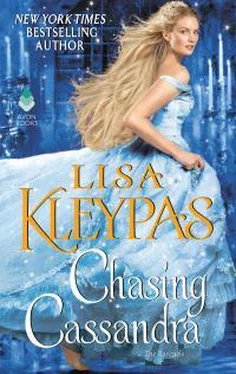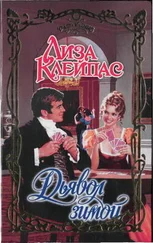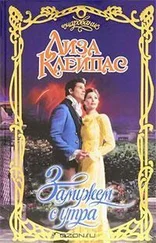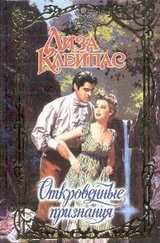“They’re not your slums, I hope?” Cassandra asked apprehensively. “You don’t own them?”
The question annoyed him. “No, they’re not mine.”
Barnaby spoke up helpfully. “Once the bill is passed, however, Mr. Severin will have the power to buy or underpin any property he wants, to make the railway go through. That’s why they’ve organized the Charterhouse Lane Defense Fund, to try and stop him.” At Tom’s slitted glare, Barnaby added quickly, “I mean, us.”
“So the slums will become yours,” Cassandra said to Tom.
“The residents will have to move,” Tom said defensively, “regardless of whether or not the railway line is built. Believe me, it will be a mercy for those people to be forced out of those hellholes.”
“But where will they go?” Cassandra asked.
“That’s not my business.”
“It is if you buy the tenement buildings.”
“I’m not going to buy the tenements, I’m going to acquire the land beneath them.” Tom’s scowling gaze softened slightly as it fell on Bazzle’s upturned face. “Why don’t you fetch your broom and do some sweeping?” he suggested gently.
The boy, who was bored by the conversation, seized on the suggestion eagerly. “I’ll start on the outside steps.” He hurried to Cassandra and tugged her by the hand to one of the front windows. “Mama, look down there and watch me sweep!”
Barnaby looked stunned as Bazzle ran from the office. “Did he just call her Mama?” he asked Tom blankly.
“She said I could!” called Bazzle’s retreating voice.
Cassandra sent Tom a troubled glance as she remained by the window. “Tom . . . you can’t make homeless outcasts of all those people.”
“Bloody hell,” he muttered.
“Because—in addition to your natural sense of compassion—”
A peculiar snort came from Barnaby’s direction.
“—it would be disastrous from the standpoint of public relations,” Cassandra continued earnestly, “wouldn’t it? You would appear completely heartless, which we know you are not.”
“The residents can apply for help from countless charities in London,” Tom said.
She gave him a chiding glance. “Most of those charities won’t be able to offer real help.” After a pause, she asked, “You want to be known as a public benefactor, don’t you?”
“I’d like to be known as one, but I wasn’t necessarily planning to become one.”
Cassandra turned to face him. “I will, then,” she said firmly. “You promised I could start any charity I wanted. I’m going to find or build low-cost housing for the displaced Charterhouse Lane residents.”
Tom regarded his wife for a long moment. The flash of newfound assertiveness interested him. Excited him. He approached her slowly. “I suppose you’ll want to take advantage of some of the undeveloped lots I own in Clerkenwell or Smithfield,” he said.
She lifted her chin slightly. “I might.”
“You’ll probably rook some of my own people into working for you . . . architects, engineers, contractors . . . all at cut-rate fees.”
Her eyes widened. “Could I?”
“I wouldn’t even be surprised if you forced Barnaby, who has access to all my connections and resources, to act as your part-time assistant.”
As Tom stared into his wife’s beautiful face, he heard Barnaby exclaim in a heartfelt voice behind them, “Oh, must I?”
“Do you think I could succeed?” Cassandra whispered.
“Lady Cassandra Severin,” Tom said quietly, “that you’ll succeed is not even a question.” He gave her a wry glance. “The question is, are you going to spend the rest of our marriage trying to make me live up to your standards?”
Her eyes flickered with impish humor. She was about to reply, but she happened to glance outside at the front steps several stories below them, where Bazzle’s small figure stood waving up to them.
At that moment, a huge, hulking form ran up to the steps and grabbed the child, lifting him off his feet.
Cassandra let out a cry of panic. “Tom!”
He took one glance and bolted through the office as if the devil were at his heels.
By the time Tom had reached the front steps, the stranger had made it halfway down the block with the wailing child, and had shoved him into a dilapidated hackney cab driven by a skinny, whey-faced young driver.
Tom sprinted to the horse’s head and grabbed the bridle. “If you try to drive off with him,” he panted to the cabman with a murderous glare, “you won’t bloody live to see another day. I swear it.” He directed his voice to Bazzle. “Get out of the cab, boy.”
“Mr. Severin,” Bazzle sobbed. “It’s . . . it’s Uncle Batty . . .”
“Get out of the cab,” Tom repeated patiently.
“The ’igh and mighty Tom Severin,” the big, grizzled brute sneered. “Noffing but a common thief! Stealin’ away a man’s living! This ’ere is my pigeon. You wants to make a nancy o’ the little sod, you ’as to pay for it.”
Bazzle called out tearfully, “I ain’t no sod! Leave Mr. Severin alone! ’E ain’t done noffing to yer.”
“’E robbed me o’ yer rightful earnings wot I was due,” Uncle Batty retorted. A sneer twisted his face. “No one steals from me. I’m taking back wot’s mine.” Without looking at Bazzle, he said, “Mind me, boy, or I’ll wring this fine feathered toff’s neck like a chicken fit for the plucking.”
“Don’t touch ’im,” the boy cried.
“Bazzle,” Tom said, “listen to me. Climb out of that damned cab and go back to the office building. Wait for me there.”
“But Uncle Batty will—”
“ Bazzle ,” Tom said curtly.
To Tom’s relief, the boy obeyed, slowly descending from the cab and heading toward the steps. Tom let go of the horse’s bridle and moved to the pavement.
“Wot’s the brat to yer anyways?” Uncle Batty sneered, circling him. “Bazzle ain’t worth the time o’ day to yer.”
Tom didn’t reply, only countered his movements, keeping his gaze fixed on the other man’s face.
“Going to lay yer flat, I am,” Uncle Batty continued. “Pound ye to a paste. Or . . . if ye cares to toss some blunt me way, I might leave yer be.”
“I wouldn’t give you a farthing, you gatless arsewit,” Tom said. “It’s the surest guarantee you’d come back for more.”
“As the gen’leman wishes,” the other man growled, and lunged for him. Tom sidestepped, turned swiftly, and was ready with a jab, cross and a hard left hook when he came upright.
Uncle Batty stumbled back and roared with outrage. He plowed forward again, absorbing a blow to his side and another to his stomach before landing an overhand punch that sent Tom reeling back. Pressing forward, Batty pounded him with an uppercut and another right, but Tom sidestepped to deflect the force of the blow. With bullish rage, Batty launched at him, sending them both to the ground. A burst of white sparks went across Tom’s vision as his head hit the pavement.
When Tom came to himself, he was rolling across the ground with the massive figure, trading blows, using knees, elbows, fists, any means to gain an advantage. He smashed a fist into the bastard’s face, sending a spray of blood over them both. The big body beneath him went still, groaning in defeat. Tom kept pounding, machine-like, the breath sawing from his lungs, his muscles burning in agony.
He felt a multitude of hands grabbing him, pulling him away. Unable to see clearly, he dragged his sleeve across his eyes. In the tumult and fury, he became aware of a small body pressed tightly to him, skinny arms cinched around his waist.
“Sir . . . sir . . .” Bazzle sobbed.
“Bazzle,” Tom slurred, his head spinning. “You’re my boy. No one takes you away from me. No one.”
Читать дальше












